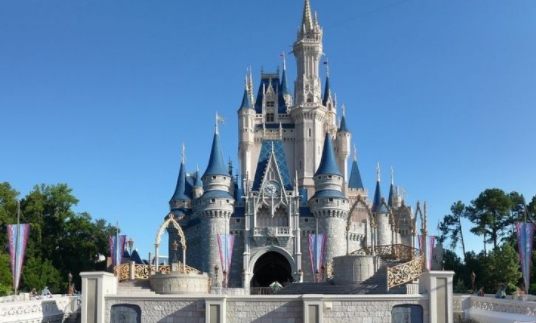Disney executives had high hopes for their latest animated film, “Wish,” believing it would be a culmination of a century of pop culture dominance. They anticipated it would become a beloved classic, on par with timeless films like “Beauty and the Beast” or “The Little Mermaid.”
The movie intentionally paid tribute to the style, narrative, and music of those iconic classics, aiming to evoke a sense of nostalgia and goodwill as the company celebrated its centennial. However, “Wish” also incorporated Disney’s divisive “woke” ideology, which has proven to be detrimental. Instead of achieving great success, it appears that “Wish” will mark another year of disappointing box office results for the renowned House of Mouse. Historically, the Thanksgiving holiday weekend has been a triumph for Disney, but this time, it seems they may not experience the same level of triumph.
On November 22, 2013, the highly anticipated film “Frozen” was released, and it proved to be a massive success. During its opening weekend, it raked in an impressive $67 million at the box office. As time went on, its popularity continued to soar, eventually grossing over $1.2 billion overall.
Fast forward to 2019, and the sequel, “Frozen II,” made its debut on the same day. It surpassed all expectations by earning a staggering $130 million during its opening weekend. Its total earnings reached a remarkable $1.4 billion, making it the second highest-grossing animated film of all time, just behind Disney’s own “live-action” remake of “The Lion King.”
In stark contrast, the film “Wish” had projected earnings of $45-$50 million from November 22-26. However, it fell short and disappointingly only managed to bring in a meager $31.6 million, as reported by The Hollywood Reporter.
Despite facing challenges due to the COVID-19 pandemic, the 2021 film “Encanto” still had a decent debut at the box office, earning approximately $40 million. Although it underperformed overall, it showcased resilience in the face of adversity.
Unfortunately for “Wish,” it faced tough competition from “The Hunger Games: The Ballad of Songbirds and Snakes,” the fifth installment in a franchise that had its last release almost a decade ago. This movie triumphed over “Wish” by collecting over $42 million during the holiday weekend.
To add insult to injury, Ridley Scott’s epic film “Napoleon,” despite receiving lukewarm reviews from both audiences and critics, managed to outperform “Wish” at the box office. This nearly three-hour behemoth claimed its spot, leaving “Wish” trailing behind.
According to a report by ScreenRant, the second weekend of the film is expected to be an even greater failure, with a mere $7 million in box office earnings. This makes “Wish” almost certain to be a major disappointment.
In 2023, another animated film called “Elemental,” which was released under the Disney umbrella, initially struggled at the box office. It only managed to earn $27 million during its opening weekend in June.
Eventually, the movie barely broke even, making $495 million worldwide on a $200 million budget. However, it still fell far behind Pixar’s pre-pandemic releases.
It is important to note that a film generally needs to earn 2.5 times its budget to be considered profitable.
This poses a significant challenge for “Wish,” as it also had a budget of around $200 million and performed worse than “Elemental” during its opening weekend.
Disney’s previous animated release in November 2022, “Strange World,” had a dismal opening weekend, earning only $18 million. It also struggled to reach half of its reported budget ($135-$180 million).
Disney’s live-action movies have fared even worse in 2023. Films such as “Ant-Man and The Wasp: Quantumania,” “Indiana Jones and the Dial of Destiny,” “Haunted Mansion,” “The Marvels,” and the live-action remake of “The Little Mermaid” had budgets exceeding a billion dollars (excluding post-production and advertising costs), and all of them experienced significant failures.
Disney’s recent string of commercial failures can be attributed to its strong support for leftist social causes, particularly LGBT ideology. The company has become a prominent advocate for these causes, especially when it comes to content aimed at children. GLAAD, the Gay and Lesbian Alliance Against Defamation, recognized Disney as one of the leading companies in Hollywood for its inclusive representation of the LGBT community. Key figures within the company have openly acknowledged their intention to promote a “not-so-secret gay agenda” through their programming. However, this approach has faced significant backlash from conservatives, who hold unfavorable views of Disney.
According to a survey by Rasmussen Reports, 60% of Republicans have an unfavorable opinion of the company, with 35% expressing a “very unfavorable” view. The criticism from conservatives was evident in the reception of films like the sequels to “Ant-Man” and “Indiana Jones.” Fans criticized these movies for seemingly attempting to replace the original heroes with younger female counterparts.
In “Ant-Man and The Wasp: Quantumania,” Ant-Man’s daughter becomes a teenage activist fighting against oppression and eventually gains a suit similar to her father’s. In the latest Indiana Jones film, Indy’s goddaughter Helena is also an archaeologist searching for rare artifacts. When accused of stealing from native people, she responds with a remark about capitalism. Additionally, two of Disney’s animated films released in 2022, “Lightyear” and “Strange World,” faced criticism from conservatives for their inclusion of LGBT themes.
The film “Lightyear” featured a scene where two female characters share a same-sex kiss. Initially, this scene was removed from the movie, but Disney decided to reinstate it after Florida passed a bill prohibiting discussions on sexual orientation and gender identity in classrooms for young children.
In “Strange World,” Disney introduced their first openly gay main character, whose romantic relationship with another boy plays a significant role in the plot.
The movie also delivers a heavy-handed environmental message.
Another animated film released by Disney last year, “Turning Red,” faced criticism for its inclusion of sexual themes and a line that echoed the pro-abortion slogan “my body, my choice.”






